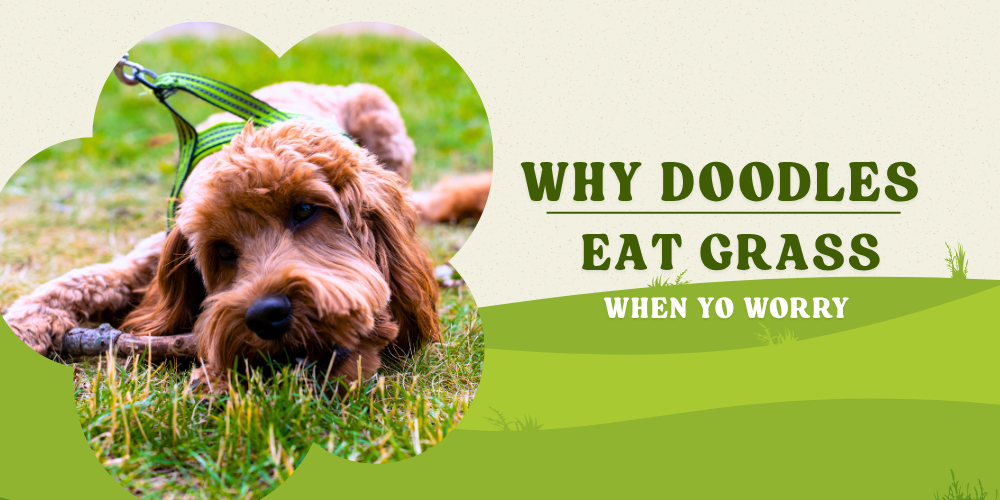
Why Doodles Eat Grass and When to Worry
|
|
Time to read 4 min
|
|
Time to read 4 min
Hey there, Doodle Owners! Elina here.
Watching your Doodle munch on grass during walks can raise questions about whether this behavior is normal or cause for concern.
Most Doodle owners notice their dogs eating grass at some point, and understanding the reasons behind this behavior helps you determine when it's perfectly natural versus when it might signal an issue.
Grass eating represents one of the most common natural behaviors in dogs, including Doodles. This instinct traces back to their wild ancestors who consumed plant matter as part of their omnivorous diet.
Your Doodle's genetics still carry these ancestral feeding patterns, making grass consumption a normal part of their behavioral repertoire.
Many Doodles eat grass simply because it's available and their instincts drive them to sample different textures and flavors in their environment. This exploratory behavior often starts in puppyhood and continues throughout their lives without indicating any underlying problems.
Some Doodles eat grass to help with minor digestive discomfort. The grass can act as a natural fiber source that aids in digestion or helps move things along in their digestive tract. Many dogs instinctively know that certain plants can provide relief for mild stomach upset.
The texture of grass can also help with hairball elimination, particularly beneficial for Doodles with longer coats who may ingest more hair during self-grooming. Eating grass provides a natural way to expel accumulated hair or other non-digestible materials.
Doodles may eat grass when seeking additional nutrients not fully satisfied by their regular diet.
Grass contains various vitamins, minerals, and chlorophyll that some dogs crave. This behavior often indicates your Doodle's body recognizing a nutritional gap and attempting to address it naturally.
Fresh spring grass, in particular, contains higher levels of certain nutrients that appeal to many dogs. Your Doodle might show increased interest in grass eating during certain seasons when new growth provides different nutritional profiles.
Active Doodles require mental stimulation, and grass eating sometimes serves as entertainment when other activities aren't available. This exploratory behavior allows them to engage their senses through taste, smell, and texture while investigating their environment.
Young Doodles especially use grass eating as part of their learning process about the world around them. This curiosity-driven behavior typically decreases as they mature and find other forms of mental stimulation.
While occasional grass eating is normal, obsessive or constant grass consumption warrants attention.
If your Doodle seems compelled to eat grass during every outdoor opportunity exceeds normal boundaries.
Sudden increases in grass eating frequency, particularly when your Doodle previously showed little interest, can indicate underlying digestive issues or other health concerns that require professional evaluation.
Grass eating combined with other symptoms creates a more concerning picture. Watch for signs like:
These combinations suggest your Doodle might be using grass eating to address specific discomfort rather than engaging in normal exploratory behavior.
Dramatic shifts in grass eating patterns often signal something beyond normal behavior. A Doodle who never showed interest in grass suddenly becoming obsessed, or a regular grass eater completely stopping, both warrant closer observation.
These behavioral changes sometimes precede other health symptoms, making early recognition valuable for addressing potential issues before they become more serious.
Frantic or urgent grass eating presents differently from casual sampling. Dogs exhibiting this behavior often seek out grass immediately upon going outside, consume it quickly, and may appear focused solely on finding and eating grass.
This urgent behavior sometimes indicates your Doodle is trying to address specific digestive discomfort or nausea. The rapid consumption and focused attention suggest a purpose beyond casual exploration.
Several elements affect how frequently and intensely your Doodle engages in grass eating:
Ensuring your Doodle's safety while allowing natural grass eating requires attention to your environment.
Avoid areas treated with pesticides, herbicides, or fertilizers that could harm your dog if ingested with the grass.
Choose safe locations for grass eating, such as your own untreated yard or designated dog parks that maintain chemical-free environments.
Providing alternative outlets for the same needs grass eating satisfies can reduce your Doodle's reliance on this behavior:
Supporting your Doodle's digestive health can reduce grass eating motivated by stomach discomfort.
Probiotic supplements designed for dogs help maintain healthy gut bacteria balance, potentially reducing the digestive issues that drive some grass eating behavior.
Providing appropriate mental stimulation through interactive toys helps address boredom-related grass eating. Durable puzzle toys and treat-dispensing options keep your Doodle engaged and reduce their need to seek entertainment through grass consumption.
Understanding why your Doodle eats grass helps you distinguish between normal behavior and potential concerns.
Most grass eating represents natural, harmless behavior that doesn't require intervention. However, sudden changes, excessive frequency, or accompanying symptoms warrant closer attention and possible veterinary consultation.
Creating safe environments for natural grass eating while providing appropriate alternatives ensures your Doodle can express their instincts safely.
Have you noticed specific patterns in your Doodle's grass eating behavior? Comment below and share what you've observed with other Doodle owners!




